

Four Keys To Apple’s Success - Tech Europe. Joswiak: Try to be the best, or don’t enter the market Dressed in a suitably flamboyant shirt, Greg Joswiak (“Call me “Jos”‘) is part of the product marketing team who brought us the iPod, the iPhone and the iOS.
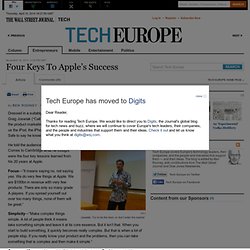
Safe to say he knows about marketing. He told the audience at Silicon Valley Comes to Cambridge what he thought were the four key lessons learned from his 20 years at Apple. Focus—”It means saying no, not saying yes. 20Calendars. Ispirati e scatta Scarica gratuitamente da iTunes l’App Lavazza 20Calendars e scatta le tue foto.
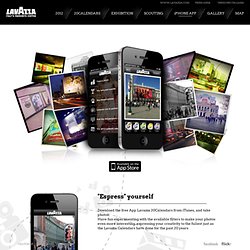
Divertiti ad applicare i filtri a tua disposizione per rendere le tue foto ancora più interessanti portando alla massima espressione la tua creatività proprio come accade da 20 anni nei Calendari Lavazza. How to Pitch an Idea to Your Boss, Colleagues and Customers. The Power of Uncertainty. 7 Tips For Rapid Iteration (aka The Quirky Approach) My career has been all about rapid iteration – generating lots of ideas and then quickly testing them to find the ones worth pursuing.
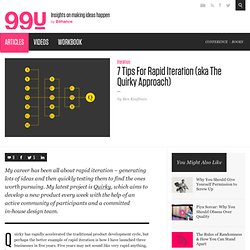
My latest project is Quirky, which aims to develop a new product every week with the help of an active community of participants and a committed in-house design team. Quirky has rapidly accelerated the traditional product development cycle, but perhaps the better example of rapid iteration is how I have launched three businesses in five years. Five years may not sound like very rapid anything, but trust me, it was. For Great Leadership, Clear Your Head - Joshua Ehrlich. The Creativity Crisis? What Creativity Crisis? - Michael Schrage. By Michael Schrage | 4:06 PM August 25, 2010 The most important thing to understand about America’s “crisis of creativity” is that there isn’t one.
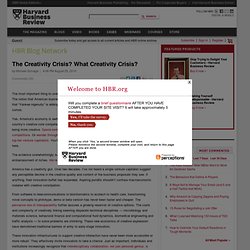
Four Destructive Myths Most Companies Still Live By - Tony Schwartz. By Tony Schwartz | 11:17 AM November 1, 2011 Myth #1: Multitasking is critical in a world of infinite demand.

The Nine Passions Of 3M's Mauro Porcini. Mauro loves his pink lion.
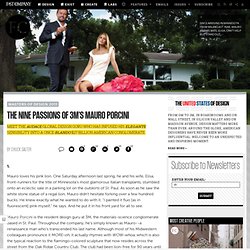
One Saturday afternoon last spring, he and his wife, Elisa, front-runners for the title of Minnesota's most glamorous Italian transplants, stumbled onto an eclectic sale in a parking lot on the outskirts of St. Paul. 10 Amazing Life Lessons You Can Learn From Albert Einstein. Einstein has made great contributions to the scientific world, including the theory of relativity, the founding of relativistic cosmology, the prediction of the deflection of light by gravity, the quantum theory of atomic motion in solids, the zero-point energy concept, and the quantum theory of a monatomic gas which predicted Bose–Einstein condensation, to name a few of his scientific contributions.
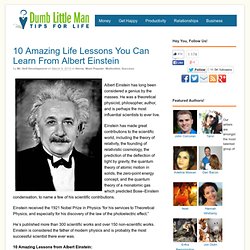
Einstein received the 1921 Nobel Prize in Physics “for his services to Theoretical Physics, and especially for his discovery of the law of the photoelectric effect.” He’s published more than 300 scientific works and over 150 non-scientific works. Einstein is considered the father of modern physics and is probably the most successful scientist there ever was. 10 Amazing Lessons from Albert Einstein: Follow Your Curiosity“I have no special talent. 30 Really Informative and Beautiful Infographics. Infographics are another sources of interesting information, when you are in need of some.

Reading boring, long, color-less articles isn’t such attractive and interesting rather than reading and viewing facts, numbers in an illustrated way. In the round-up of this week, we have compiled more than 30 nice-looking, well-designed and informative posters and infographics. The Online Communities The following infographic shows us a detailed world map, containing the most popular websites, social networks and communication applications, from all over the world. Critical Thinkers. 79 Totally Awesome Infographics – Creative!
Interactive. The World of Seven Billion The map shows population density; the brightest points are the highest densities.
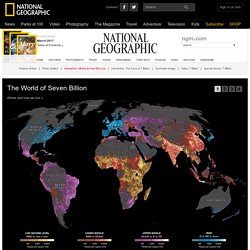
Each country is colored according to its average annual gross national income per capita, using categories established by the World Bank (see key below). Some nations— like economic powerhouses China and India—have an especially wide range of incomes. But as the two most populous countries, both are lower middle class when income is averaged per capita. The 10 Commandments of Steve Jobs [Infographic] Newsweek’s The Daily Beast published an interesting infographic on Steve Jobs and his supposed playbook for managing the creative process at Apple.
![The 10 Commandments of Steve Jobs [Infographic]](http://cdn.pearltrees.com/s/pic/th/commandments-steve-infographic-15333367)
Steve Jobs: Parting Quotes For Today's Entrepreneurs. By now you've likely heard that Steve Jobs has resigned as CEO of Apple and plans to continue as chairmen of the board. COO, Tim Cook, who has filled in for Jobs in recent years during his various medical leaves while he first battled pancreatic cancer and then recovered from a liver transplant, will step in as CEO. There is much to be analyzed and reported on regarding this announcement. Every newspaper, blog and tech news outlet in the world is weighing in right now with their take on what this means for Apple, the tech industry itself, Steve Jobs and his legacy.
In today's world of 2011, we tend to focus on only Steve Jobs, the CEO. The CEO of one of the largest companies in the world (tech or otherwise, keep in mind Apple just surpassed Exxon). What I Learned From Steve Jobs. Many people have explained what one can learn from Steve Jobs. A Manifesto For Free Radicals: Less Paperwork, Less Waiting, More Action. 19 Reasons To Ignore Everybody And Follow Your Dreams. Nine Things Successful People Do Differently - Heidi Grant Halvorson. Entrepreneurship as Disease - Jeff Stibel. By Jeff Stibel | 4:54 PM September 14, 2010. The Four Capacities Every Great Leader Needs (And Very Few Have) - Tony Schwartz. Six Keys to Changing Almost Anything - Tony Schwartz.
By Tony Schwartz | 10:58 AM January 17, 2011. 11 Inspiring Life Lessons from Bruce Lee.